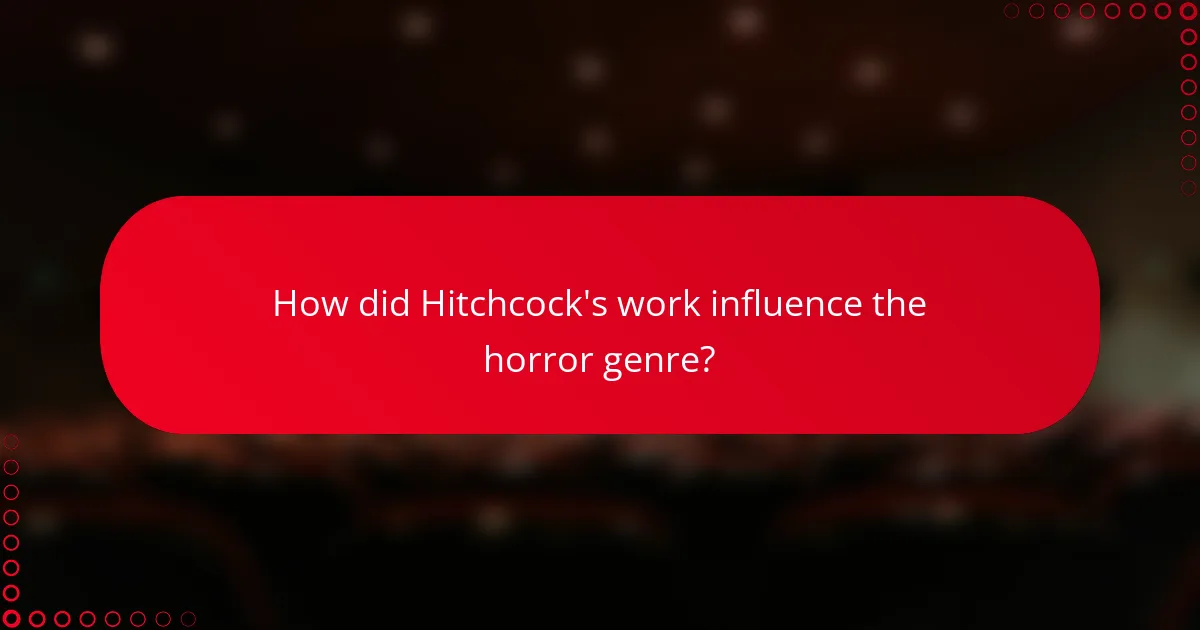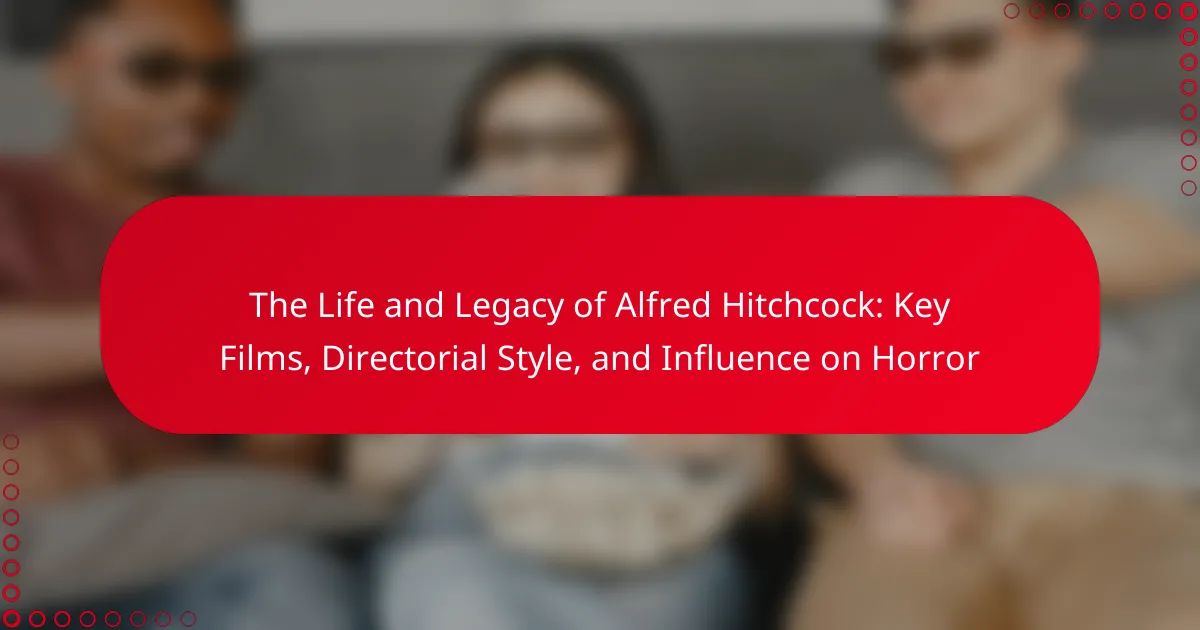Alfred Hitchcock is a pivotal figure in film history, renowned for his innovative contributions to the suspense and psychological thriller genres. His films, including “Psycho” and “Vertigo,” are celebrated for their groundbreaking techniques, such as the use of camera angles and editing that enhance tension and audience engagement. Hitchcock’s exploration of themes like guilt and voyeurism has set new standards in horror, influencing countless filmmakers and shaping modern cinematic storytelling. His legacy is characterized by a unique narrative style that continues to inspire the horror genre today.

What is the significance of Alfred Hitchcock in film history?
Alfred Hitchcock is significant in film history as a pioneering director known for his mastery of suspense and psychological thrillers. He introduced innovative techniques, such as the use of camera angles and editing to create tension. Hitchcock’s films often explored themes of guilt, voyeurism, and the complexities of human psychology. His notable works include “Psycho,” which revolutionized horror with its shocking narrative twists. “Vertigo” is frequently cited as one of the greatest films of all time, showcasing his unique storytelling approach. Hitchcock’s influence extends to modern filmmakers, who continue to draw inspiration from his techniques and narrative styles. His contributions have solidified his status as the “Master of Suspense” in cinema.
How did Alfred Hitchcock’s early life influence his filmmaking?
Alfred Hitchcock’s early life significantly influenced his filmmaking style and themes. He was born in 1899 in London, England. His strict upbringing in a Catholic household instilled a sense of fear and anxiety. This background contributed to his fascination with psychological themes in his films.
Hitchcock’s early experiences in the film industry began in the 1920s. He worked as a title card designer and later as a director. His exposure to silent films shaped his understanding of visual storytelling. The influence of German Expressionism is evident in his use of shadows and light.
Furthermore, his childhood experiences with isolation and fear are reflected in many of his characters. He often explored themes of guilt, betrayal, and the darker aspects of human nature. These elements became hallmarks of his suspenseful narratives.
Overall, Hitchcock’s formative years laid the groundwork for his innovative approach to filmmaking. His unique perspective on fear and suspense continues to resonate in modern cinema.
What key experiences shaped Hitchcock’s directorial approach?
Alfred Hitchcock’s directorial approach was shaped by several key experiences. His early work in silent films influenced his emphasis on visual storytelling. Hitchcock’s childhood in London, marked by strict parental discipline, instilled a sense of fear and tension in his narratives. His experience in the German film industry introduced him to innovative techniques, such as expressionism, which later defined his style. The impact of World War I on his worldview contributed to his fascination with psychological themes and suspense. Additionally, his collaboration with actors and technicians helped refine his meticulous attention to detail in filmmaking. Each of these experiences played a crucial role in developing Hitchcock’s unique cinematic voice.
How did his background inform his themes and storytelling?
Alfred Hitchcock’s background significantly influenced his themes and storytelling. He was born in England, which shaped his early exposure to suspense and psychological tension. Hitchcock’s experiences with strict Catholic upbringing informed his exploration of guilt and morality in his films. His early career in silent films honed his ability to convey emotion visually, emphasizing the importance of visual storytelling. The themes of voyeurism and obsession in his work reflect his fascination with human psychology, influenced by his own introspective nature. Additionally, his move to Hollywood allowed him to blend British sensibilities with American cinematic techniques, enriching his narrative style. His background in theater further contributed to his mastery of pacing and dramatic tension. Each of these elements combined to create a distinctive storytelling approach that remains influential in the horror genre.
What are the defining characteristics of Hitchcock’s directorial style?
Hitchcock’s directorial style is defined by suspense, psychological depth, and innovative camera techniques. He expertly builds tension through pacing and editing. His use of the “MacGuffin” drives the plot while keeping audiences engaged. Hitchcock often employed voyeuristic perspectives, creating a sense of unease. He utilized sound design to enhance emotional impact, as seen in “Psycho.” His meticulous storyboarding ensured visual coherence and clarity. Hitchcock’s films frequently explore themes of obsession and guilt, revealing complex characters. His influence on the thriller genre remains profound and enduring.
How does suspense play a role in Hitchcock’s films?
Suspense is a fundamental element in Hitchcock’s films. He masterfully builds tension through pacing, music, and visual cues. Hitchcock often employs the “bomb under the table” technique. This means the audience knows about impending danger while characters remain unaware. This creates a heightened sense of anxiety. His use of close-ups emphasizes characters’ emotions, enhancing viewer connection. For example, in “Psycho,” the shower scene utilizes suspenseful music to amplify fear. Hitchcock’s storytelling often involves unexpected twists that keep audiences on edge. His innovative techniques have influenced countless filmmakers in the thriller genre.
What techniques did Hitchcock use to develop tension and fear?
Hitchcock developed tension and fear through techniques such as suspenseful pacing, innovative camera angles, and sound design. He often employed the “MacGuffin” to divert attention while building suspense. His use of close-ups heightened emotional intensity and created a sense of claustrophobia. Hitchcock mastered the art of the “wrong man” narrative, which placed innocent characters in perilous situations. He also utilized silence effectively, allowing the audience’s imagination to fill in the gaps. The famous shower scene in “Psycho” exemplifies his ability to evoke fear through editing and music. Hitchcock’s psychological manipulation of characters and viewers contributed significantly to his films’ lasting impact on the horror genre.
What are some of Alfred Hitchcock’s most influential films?
Alfred Hitchcock’s most influential films include “Psycho,” “Rear Window,” and “Vertigo.” “Psycho,” released in 1960, revolutionized the horror genre with its shocking plot twists. It introduced the famous shower scene, which is still studied in film schools. “Rear Window,” from 1954, showcased Hitchcock’s mastery of suspense and voyeurism. It explores themes of observation and morality through a confined setting. “Vertigo,” released in 1958, is often regarded as one of the greatest films of all time. It delves into obsession and psychological manipulation, influencing countless filmmakers. These films are critical in understanding Hitchcock’s impact on cinema and the horror genre.
Which films are considered his masterpieces and why?
Psycho, Vertigo, and Rear Window are considered Alfred Hitchcock’s masterpieces. Psycho revolutionized the horror genre with its shocking plot twists and innovative storytelling techniques. Vertigo is acclaimed for its complex narrative and psychological depth, exploring themes of obsession and identity. Rear Window showcases Hitchcock’s mastery of suspense, using a confined setting to build tension and intrigue. Each film exemplifies Hitchcock’s unique directorial style, characterized by meticulous attention to detail and groundbreaking cinematic techniques. These films have left a lasting impact on both audiences and filmmakers, solidifying Hitchcock’s legacy as a master of suspense.
How did these films impact the horror genre specifically?
Alfred Hitchcock’s films significantly impacted the horror genre by introducing psychological elements and innovative storytelling techniques. His film “Psycho” revolutionized horror with its unexpected twists and the use of a shocking narrative structure. The infamous shower scene created a new standard for suspense, emphasizing psychological terror over graphic violence. Hitchcock’s ability to build tension through music and sound design influenced countless filmmakers. His exploration of themes such as paranoia and the unreliable narrator deepened the genre’s complexity. Films like “The Birds” showcased nature as an unpredictable antagonist, expanding horror’s boundaries. Hitchcock’s legacy continues to inspire modern horror directors, shaping the genre’s evolution.

How did Hitchcock’s work influence the horror genre?
Hitchcock’s work significantly influenced the horror genre through innovative storytelling techniques and psychological depth. His film “Psycho” redefined horror by introducing elements of suspense and shock. The use of the unexpected twist in the narrative became a hallmark of horror films. Hitchcock’s mastery of tension and pacing heightened audience engagement. He often blurred the lines between victim and villain, adding complexity to characters. This psychological approach inspired filmmakers to explore deeper themes of fear and anxiety. Additionally, his pioneering use of sound and visual techniques set new standards in cinematic horror. Hitchcock’s legacy continues to shape the genre today.
What elements of horror can be traced back to Hitchcock’s films?
Hitchcock’s films introduced several key elements of horror. These include psychological tension and suspense. He often depicted ordinary settings turned sinister. The use of voyeurism plays a crucial role in his storytelling. Hitchcock’s characters frequently experience paranoia and fear. He employed innovative camera techniques to enhance dread. His films often feature unexpected plot twists. The theme of isolation is prevalent in his works. These elements have significantly influenced the horror genre.
How did Hitchcock’s techniques redefine horror storytelling?
Hitchcock’s techniques redefined horror storytelling by introducing psychological depth and suspense. He emphasized the importance of character psychology over mere gore. His use of innovative camera angles created a sense of unease. Techniques like the “MacGuffin” shifted focus from the horror itself to the characters’ reactions. He expertly manipulated audience anticipation through pacing and editing. Films like “Psycho” showcased the unexpected, breaking traditional narrative structures. The infamous shower scene redefined violence in cinema, making it more impactful. Hitchcock’s methods laid the groundwork for modern horror by prioritizing tension and emotional engagement.
What themes in horror were popularized by Hitchcock?
Alfred Hitchcock popularized several key themes in horror. One prominent theme is the psychological manipulation of characters. Hitchcock often explored the complexities of the human mind, creating suspense through character-driven narratives. Another significant theme is the use of voyeurism. Films like “Rear Window” highlight the tension between observer and observed. The theme of the innocent accused is also prevalent, as seen in “The 39 Steps.” This theme creates empathy for characters facing unjust situations. Additionally, Hitchcock introduced the theme of the macabre in everyday life. He often juxtaposed normalcy with horrific events, enhancing the shock factor. His work also emphasized the concept of fear rooted in the unknown. This theme is evident in “Psycho,” where the audience is kept in suspense about the antagonist’s motives. Overall, Hitchcock’s themes have profoundly influenced the horror genre, shaping its narrative and stylistic conventions.
In what ways did Hitchcock inspire future filmmakers?
Alfred Hitchcock inspired future filmmakers through his innovative techniques and storytelling methods. He popularized the use of suspense, creating tension through careful pacing and editing. Hitchcock’s mastery of visual storytelling influenced the way filmmakers approach narrative structure. His use of camera angles and framing established new standards for cinematography. He also pioneered the use of sound to enhance emotional impact in films. Hitchcock’s films, such as “Psycho,” introduced psychological complexity in characters, influencing character development in later works. His unique approach to genre blending set a precedent for future filmmakers exploring horror and thriller elements. Many directors, including Martin Scorsese and Steven Spielberg, cite Hitchcock as a significant influence on their work.
Which contemporary directors cite Hitchcock as an influence?
Contemporary directors who cite Alfred Hitchcock as an influence include Martin Scorsese, Brian De Palma, and Guillermo del Toro. Martin Scorsese has acknowledged Hitchcock’s mastery of suspense and storytelling. Brian De Palma often emulates Hitchcock’s techniques in his thrillers. Guillermo del Toro has expressed admiration for Hitchcock’s ability to create atmosphere and tension. Each of these directors incorporates elements of Hitchcock’s style in their own films, showcasing his lasting impact on modern cinema.
How have Hitchcock’s techniques been adapted in modern cinema?
Hitchcock’s techniques have been adapted in modern cinema through suspenseful storytelling and innovative camera work. Filmmakers now utilize his method of building tension through pacing. They often mimic his use of close-ups to capture emotional intensity. Many modern thrillers employ his signature “MacGuffin” to drive the plot. Additionally, psychological horror films reflect his focus on character motivations. The use of unexpected plot twists is also a common adaptation of his style. Directors like Brian De Palma and M. Night Shyamalan have cited Hitchcock as a major influence. His impact is evident in films that prioritize atmosphere and psychological depth.

What lasting legacy did Alfred Hitchcock leave on the film industry?
Alfred Hitchcock’s lasting legacy in the film industry is his mastery of suspense and psychological thriller elements. He introduced innovative techniques like the “MacGuffin,” a plot device that drives the narrative. Hitchcock’s use of camera angles and editing created a unique visual language. His films often explored themes of voyeurism and guilt, influencing countless filmmakers. Works such as “Psycho” and “Rear Window” set new standards for horror and suspense genres. Hitchcock’s storytelling techniques have been studied and emulated in cinema schools worldwide. His impact is evident in modern thrillers, with directors frequently citing him as an influence. Hitchcock’s ability to engage audiences through tension and surprise remains unparalleled.
How is Hitchcock’s impact still felt in contemporary filmmaking?
Hitchcock’s impact is still felt in contemporary filmmaking through his innovative techniques and narrative structures. His mastery of suspense and psychological tension continues to influence genres like thriller and horror. Filmmakers often adopt his use of camera angles to create unease. Techniques such as the “Hitchcock zoom,” or dolly zoom, are prevalent in modern films. His storytelling approach, focusing on character psychology, remains a staple in screenwriting. Films like “Psycho” set standards for plot twists and shocking moments. Directors such as Martin Scorsese and Brian De Palma openly cite Hitchcock as a key influence. The use of unreliable narrators in films today can often be traced back to Hitchcock’s storytelling methods. His legacy is evident in both mainstream and independent cinema.
What awards and recognitions has Hitchcock received posthumously?
Alfred Hitchcock has received several posthumous awards and recognitions. In 1980, the American Film Institute honored him with the AFI Life Achievement Award. He was inducted into the Hollywood Walk of Fame in 1960, with a star dedicated to him posthumously. In 1999, the British Film Institute named him the greatest British director of all time. Additionally, Hitchcock was awarded the Academy’s Irving G. Thalberg Memorial Award in 1971, recognizing his contributions to film. His films continue to receive accolades, with many being included in the American Film Institute’s lists of the greatest films.
How do film studies and critiques evaluate Hitchcock’s contributions today?
Film studies and critiques evaluate Hitchcock’s contributions as foundational to modern cinema. His innovative techniques in suspense and narrative structure are widely recognized. Critics highlight his mastery of psychological thrillers and character development. Hitchcock’s use of visual storytelling has influenced countless filmmakers. His films often explore complex themes of guilt and obsession. Academic studies frequently analyze his pioneering use of editing and sound. Notable works such as “Psycho” and “Vertigo” are deemed essential viewing in film education. Overall, Hitchcock is celebrated for shaping the horror genre and cinematic language.
What lessons can filmmakers learn from Hitchcock’s career?
Filmmakers can learn several lessons from Alfred Hitchcock’s career. First, the importance of suspense is a key takeaway. Hitchcock mastered the art of building tension through pacing and timing. He often used the “MacGuffin,” a plot device that drives the story but is not central to the overall narrative. This technique keeps audiences engaged and guessing.
Additionally, Hitchcock emphasized the significance of character development. He believed that strong, relatable characters enhance emotional investment. His films often explore psychological complexities, making characters memorable.
Moreover, Hitchcock’s innovative use of camera techniques provides valuable insights. He frequently employed unique angles and framing to evoke specific emotions. His use of montage also contributed to storytelling, allowing for rapid progression of time and events.
Lastly, Hitchcock’s understanding of audience psychology is crucial. He knew how to manipulate viewer expectations, creating unexpected twists. This approach has influenced countless filmmakers, highlighting the power of surprise in storytelling.
What best practices can be derived from Hitchcock’s approach to storytelling?
Hitchcock’s approach to storytelling emphasizes suspense, character development, and visual storytelling. He masterfully builds tension through pacing and careful scene construction. Hitchcock often uses the “MacGuffin” to drive the plot forward, creating intrigue. He believes in showing rather than telling, utilizing visual cues to convey emotions and themes. His films often feature complex characters with relatable motivations. Hitchcock’s use of unexpected twists keeps audiences engaged and invested in the narrative. He also strategically employs sound and silence to enhance the emotional impact of scenes. These practices have influenced countless filmmakers and remain relevant in modern storytelling.
How can aspiring directors apply Hitchcock’s techniques in their work?
Aspiring directors can apply Hitchcock’s techniques by focusing on suspense and psychological tension. They should master the art of misdirection to keep audiences guessing. Hitchcock often used close-ups to convey characters’ emotions effectively. Directors can also utilize innovative camera angles to create visual storytelling.
Building tension through pacing is crucial; Hitchcock’s films often featured slow builds to climactic moments. Incorporating sound design as a narrative element enhances the viewing experience. Directors should study Hitchcock’s use of the “MacGuffin,” an object that drives the plot but holds little intrinsic value.
Finally, they can learn from his character development, creating complex, relatable characters that engage audiences. These techniques are foundational in creating impactful cinematic experiences.
Alfred Hitchcock is the central entity of the article, recognized as a pioneering director in film history known for his mastery of suspense and psychological thrillers. The article outlines Hitchcock’s significant contributions to cinema, including his innovative techniques, exploration of complex themes such as guilt and voyeurism, and his influence on the horror genre through key films like “Psycho,” “Vertigo,” and “Rear Window.” It also examines how Hitchcock’s early life shaped his filmmaking style, the defining characteristics of his directorial approach, and the lasting legacy he left on contemporary filmmakers and the horror genre. Key insights into his storytelling techniques and the lessons aspiring directors can learn from his career are also discussed.
